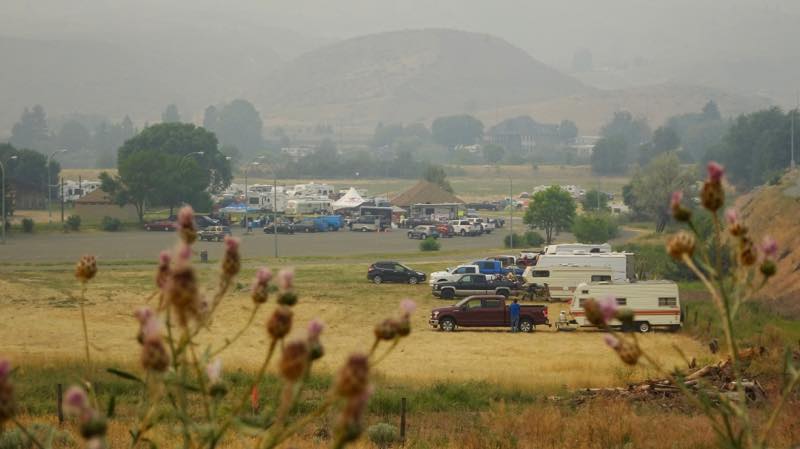First Nations in British Columbia are continuing their desperate battle to save their reserves, homes and territories from hundreds of square miles of wildfires raging in the center of the province, as the Kamloops Pow Wow Grounds were transformed into an outdoor shelter for evacuees.
With more than 45,000 people displaced and 20 First Nations in British Columbia affected by hundreds of wildfires sweeping the region as of July 17, Assembly of First Nations (AFN) National Chief Perry Bellegarde expressed support for the Indigenous Peoples affected and emphasized the importance of traditional firekeeping knowledge in preventing such blazes.
“We acknowledge the strength, resilience and in some cases the trauma associated with our families leaving their homes for safety,” said Bellegarde. “We convey our heartfelt appreciation to the firefighters, first responders, and the countless volunteers and donors that have rallied across Canada to give their support to people in British Columbia.”
Not everyone agreed to be evacuated. Tl’etinqox Chief Joe Alphonse, Chair of the Tsilhqot’in National Government, expressed gratitude that a few hundred people had refused to evacuate, staying back to fight the flames. The following weekend a fire made it to the doorstep of Tl’etinqox (Anaham) First Nation after jumping the Chilcotin River, he said in a statement on July 17. Firefighting crews, including 125 First Nation members, diverted “the fast moving inferno that stopped just prior to their community entrance,” as a statement from the Tl’etinqox government on July 17 described it.
“Our community would not be standing today had we heeded the RCMP order,” Alphonse said in a statement. “Our new Health Care Center, new school, Church, store and many homes may not be here today.”
The Tk’emlups Powwow campgrounds were hosting 300 or so people, many of them First Nations, who arrived in Kamloops fleeing the fire, reported CBC News.
“It’s an open door,” Kamloops Indian Band Chief Fred Seymour told CBC News.“Until you’re in that situation being displaced, you don’t know how your house is or when you’ll move back— we’re here to try and make it comfortable for everybody.”
While the Kamloops Pow Wow was still scheduled to go ahead on August 5–6, the Kamloops Marathon scheduled for Sunday July 23 had been canceled, as had several other events, Kamloops This Week reported.
The AFN’s branch in British Columbia also offered support and said those affected could reach out any time.
“Many BC First Nations communities and citizens have been impacted by the wildfires, and we at the BC Assembly of First Nations are committed to supporting our members in any way we can,” said Regional Chief Maureen Chapman in a statement. “This state of emergency has led to a stressful and scary set of circumstances, and our thoughts and prayers go to those affected. We have a long period of time in front of us where hot, dry and unpredictable weather conditions will continue to influence this unstable situation.”
Several people pointed out that traditional knowledge would perhaps have prevented or mitigated the fires. The Penticton Indian Band, part of the Okanagan, has been trying to revive its firekeeping tradition, which entails conducting periodic controlled burns so that catastrophic fires do not happen. Firekeeper Annie Kruger would burn berry bushes, entire hillsides and light up mountains, CBC News said. This renewed growth and cleared away brush, opening the land for renewal.
“All the little trees are burnt out and the grass feeds the deer and the deer feeds us,” Tim Lezard, a band councillor with the Penticton Indian Band, told MetroNews in describing the process. “You burn off the land and it takes the trees away and the plants that we pick. It saves them a place on the land so we can pick and eat those.”
Bellegarde said the current situation underscored the importance of retaining indigenous environmental practices.
“We have heard from our communities in the Okanagan about their history as firekeepers, and we must honor these roles and traditions passed down from generation to generation,” Bellegarde said. “We commend the leadership demonstrated by First Nations and support provided by the First Nations Health Authority and the First Nations’ Emergency Services Society of BC in this time of great need. Our prayers are for the safety and security of everyone affected by the fires.”
© 2017 Indian Country Today Media Network, all rights reserved. https://indiancountrymedianetwork.com
https://indiancountrymedianetwork.com/news/first-nations/20-first-nations-b-c-wildfires/
